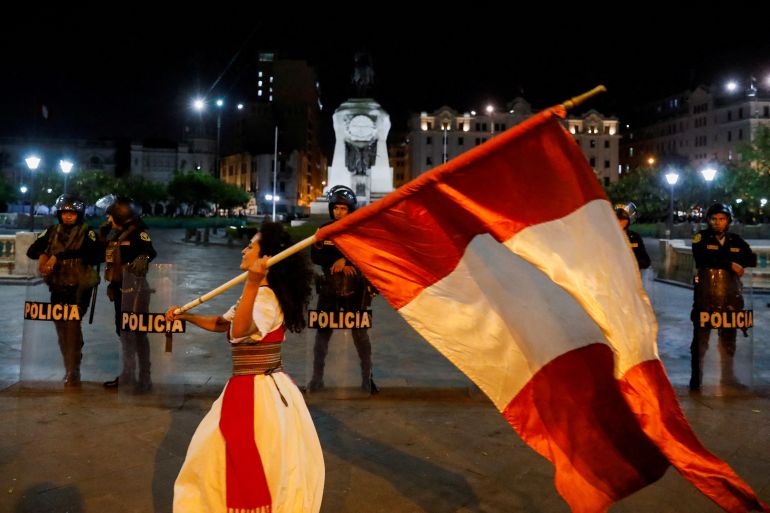Rights commission says Peru crackdown may qualify as a ‘massacre’
A new report says that the killing of protesters amid widespread unrest may constitute ‘extrajudicial executions’.

A human rights commission has stated that the Peruvian government committed abuses as it cracked down on widespread unrest following the arrest of former President Pedro Castillo in December.
In a report released on Wednesday, the Inter-American Commission on Human Rights (IACHR) said that the state’s response to nationwide protests could be classified as a “massacre”.
Keep reading
list of 3 itemsPeru recalls ambassador to Colombia amid diplomatic tensions
After political violence, Peru reckons with economic fallout
“There were serious human rights violations that must be investigated with due diligence and an ethnic-racial approach,” IACHR President Margarette May Macaulay said in a report. “The deaths could constitute extrajudicial executions.”
Peru has continued to grapple with a political crisis, sparked on December 7, when Castillo attempted to dissolve Congress and rule by decree as he faced a third impeachment hearing. Those actions led to his arrest and subsequent protests, which called for his release, new elections and a revised constitution.
Reuters reported that more than 60 people have been killed in clashes between police and protesters since December, the overwhelming majority of them protesters.
But the administration of Castillo’s successor, President Dina Boluarte, has dismissed the violence as the product of “terrorists” and agitators, and called for a national “truce”. Peruvian authorities have denied committing abuses, despite criticism of the government’s response.
IACHR said that a large number of those killed and injured in the protests had been targeted with firearms. It also found that many of the harshest responses took place in rural Andean regions such as Ayacucho and Puno, both of which have large Indigenous populations.
A previous report by the human rights group Amnesty International called the government’s crackdown “systemically racist” for disproportionately targeting Indigenous populations that have already endured a history of neglect, disenfranchisement and state violence.
In a statement on Wednesday, Amnesty called on the Canadian government to halt weapons exports to the Peruvian government.
“The state’s callous disregard for people’s lives and rights should sound the alarm for any country that has sold or plans to sell arms to Peru,” Marina Navarro, executive director of Amnesty International Peru, said in the statement.
The IACHR report was written after the commission visited Peru to meet relatives of victims, government officials and civil society members over two days in January. It follows a recent Human Rights Watch report that concluded that government forces had killed protesters.
In January, Peru’s attorney general launched a series of inquiries into protest-related deaths. Demonstrators continue to call for Boluarte’s resignation and early elections.
However, such calls have yet to translate into accountability or a path out of the country’s political crisis. Boluarte herself has urged the legislature to fast-track a new round of elections, but Congress has rejected efforts to do so.